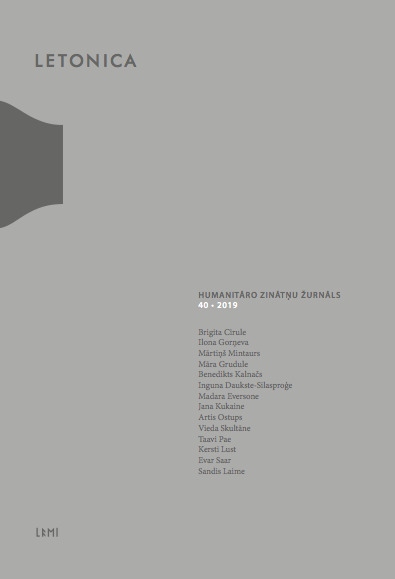Vēstures dzimšana no laikmeta gara. Dzimtenes pagātne vācbaltiešu historiogrāfijā 19. gadsimta pirmajā pusē
The Birth of the History from the Spirit of the Age. The Past of the Heimat in Baltic German Historiography at the First Half of the 19th Century
Author(s): Mārtiņš MintaursSubject(s): Cultural history, 19th Century
Published by: Latvijas Universitātes Literatūras, folkloras un mākslas institūts
Keywords: the Age of Biedermeier; the Baltic Provinces; history writing;
Summary/Abstract: The Age of Biedermeier (1815–1848) today is seen as the epoch, when professional history writing was created by scholars and intellectuals interested in the studies of human past. The Baltic Provinces of Kurland, Livland and Estland were no exclusion either. During the first decades of the 19th century a passion for the local history studies and writing arose among the Baltic German intellectuals mostly representing the members of the protestant clergy and gymnasium teachers. Academic or scholarly associations, for example, “Kurländische Gesellschaft für Literatur und Kunst in Mitau” (1815) and “Gesellschaft für Geschichte und Altertumskunde der Ostseeprovinzen Russlands in Riga” (1834) had a strong impact on the preconditions for academic studies of the local past associated in many cases with the heritage of Medieval Livonia. The conceptual framework set for these studies prescribed a perspective on the Baltic history as an integral part of the history of a particular country ruling in the East Baltic region in the given moment of time. Moreover, much attention was paid to editions of the medieval written sources of various kinds describing the political and in part economic development of Livonia from the 13th to 16th centuries. The history of Latvian and Estonian people representing the lower class within feudal society of that period was also at the center of attention. The value of medieval architectural heritage in the Baltic Provinces was recognized, first, in numerous travel descriptions and later in scholarly essays devoted to this issue. The social and intellectual background of the epoch was suited for the development of professional history writing because the rational principles of the bourgeois ethos as well as the Biedermeier aesthetics introduced a new attitude to the past: it was a source of romantic inspiration and scientific engagement that created foundations for the Baltic German conception of history, which is also shared throughout the course of the 20th century.
Journal: Letonica
- Issue Year: 2019
- Issue No: 40
- Page Range: 26-43
- Page Count: 18
- Language: Latvian

